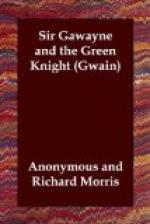Þat is larges & lewte, þat longe3 to kny3te3.
[J] Now am I fawty, & falce, & ferde haf ben euer;
Of trecherye & vn-trawþe boþe bityde sor3e
2384 & care!
[K] I bi-knowe yow, kny3t, here stylle, [Fol. 123.]
Al fawty is my fare,
Lete3 me ouer-take your wylle,
2388 & efle I schal be ware.”
[Sidenote A: For my weed (woven by my wife) thou wearest.] [Sidenote B: I know thy kisses and my wife’s wooing.] [Sidenote C: I sent her to try thee, and faultless I found thee.] [Sidenote D: But yet thou sinnedst a little,] [Sidenote E: for love of thy life.”] [Sidenote F: Gawayne stands confounded.] [Sidenote G: “Cursed,” he says, “be cowardice and covetousness both!”] [Sidenote H: Then he takes off the girdle and throws it to the knight.] [Sidenote I: He curses his cowardice,] [Sidenote J: and confesses himself to have been guilty of untruth.] [Sidenote K: ]
XVII.
[A] Thenne lo3e þat oþer leude,
& luflyly sayde,
“I halde hit hardily[1] hole, þe harme
þat I hade;
[B] Þou art confessed so clene, be-knowen of
þy mysses,
2392 & hat3 þe penaunce apert, of þe poynt of
myn egge,
[C] I halde þe polysed of þat ply3t, & pured
as clene,
As þou hade3 neuer forfeted, syþen þou wat3
fyrst borne.
[D] & I gif þe, sir, þe gurdel þat is golde hemmed;
2396 For hit is grene as my goune, sir G:, 3e
maye
Þenk vpon þis ilke þrepe, þer þou forth þrynge3
Among prynces of prys, & þis a pure token
[E] Of þe chaunce of þe grene chapel, at cheualrous
kny3te3;
2400 [F] & 3e schal in þis nwe 3er a3ayn to my wone3,
& we schyn reuel þe remnaunt of þis ryche
fest,
ful bene.”
Þer laþed hym fast þe lorde,
2404 & sayde, “with my wyf, I wene,
We schal yow wel acorde,
Þat wat3 your enmy kene.”
[Sidenote A: Then the other, laughing, thus spoke:]
[Sidenote B: “Thou art confessed so clean,]
[Sidenote C: that I hold thee as pure as if thou
hadst never been guilty.] [Sidenote D: I give
thee, sir, the gold-hemmed girdle,] [Sidenote E:
as a token of thy adventure at the Green Chapel.]
[Sidenote F: Come again to my abode, and abide
there for the remainder of
the festival.”]
[Footnote 1: hardilyly, in Ms.]
XVIII.
[A] “Nay, for soþe,”
quod þe segge, & sesed hys helme,
2408 & hat3 hit of hendely, & þe haþel þonkke3,
[B] “I haf soiorned sadly, sele yow bytyde,
& he 3elde hit yow 3are, þat 3arkke3 al menskes!
[C] & comaunde3 me to þat cortays, your comlych
fere,
2412 Boþe þat on & þat oþer, myn honoured ladye3.
Þat þus hor kny3t wyth hor kest han koyntly
bigyled.
[D] Bot hit is no ferly, þa3 a fole madde,
& þur3 wyles of wymmen be wonen to sor3e;
2416 [E] For so wat3 Adam in erde with one bygyled,
& Salamon with fele sere, & Samson eft sone3,
Dalyda dalt hym hys wyrde, & Dauyth þer-after
Wat3 blended with Barsabe, þat much bale




